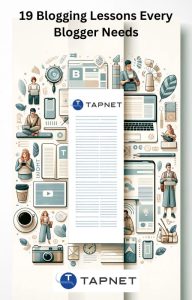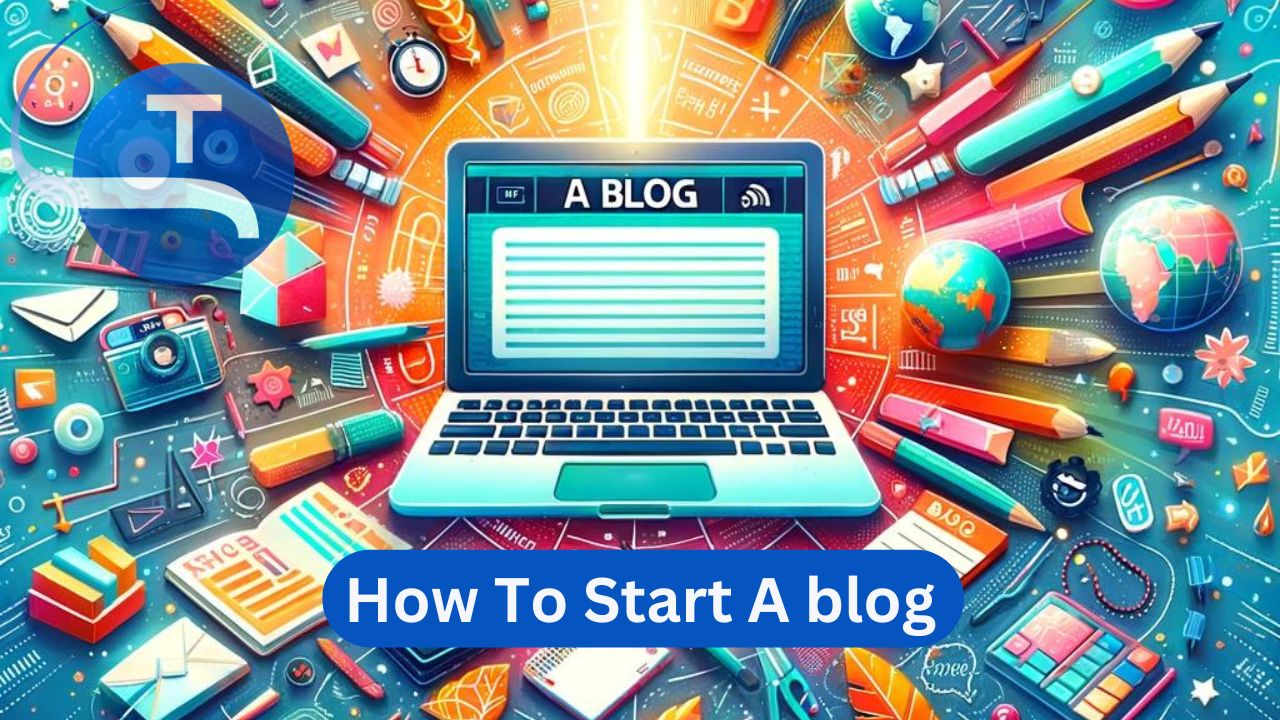How to Start a Blog: Secrets to Blogging
Are you ready to learn how to start a blog and realize your dream of becoming a
successful content creator? Blogging is a great way to share your knowledge, passions, and insights with a global audience, and potentially even turn your blogging into a lucrative business.
As the founder of TAPNET and author of several publications, I’m here to help in whichever chapter you are in your blogging career. Not only as a guide but as someone who’s walked this path and discovered the power of effective blogging.
I’m going to share with you essential steps to get started, combined with a free downloadable resource titled “19 Blogging Lessons Every Blogger Needs,”. This free blogging guide is only available at TAPNET.com, designed to equip you with critical blogging wisdom.
Deciding Your Niche When You Start A Blog
The first decision to make as you start a blog is selecting your blog’s niche: deciding
your blog’s niche. This decision shapes everything that follows, from your audience to the type of content you’ll produce. A well-chosen niche allows you to focus your efforts on a specific area of interest, making your blog a go-to resource for targeted topics.
Think about what you’re passionate about and how it aligns with what others are interested in learning. This synergy between passion and demand is the sweet spot for any successful blog. Remember, a focused niche helps you create more impactful content, attract a loyal readership, and, importantly, stand out in a crowded digital
space.
Choosing the Right Blogging Platform
Choosing the right blogging platform is critical when you decide to start a blog.. Your choice of platform has significant implications for the future of your blog, affecting everything from how your content is presented to how it can be monetized.
WordPress, for example, is renowned for its flexibility and extensive customization options, making it an excellent choice for bloggers who envision a blog that grows and evolves with them.
Consider your technical proficiency and long-term goals when choosing a platform. Some platforms offer ease of use and are excellent for beginners, while others provide the tools necessary for a more hands-on approach to design and functionality. It’s all about finding the right balance that suits your vision and skill level.
Setting Up Your Blog
The initial steps to start a blog involve carefully setting up your blog: selecting a domain name and finding the right hosting service. Your domain name is your online identity; it should be memorable, relevant, and reflective of your niche. It’s the first step in making a good impression on your visitors.
When it comes to hosting, reliability and speed are non-negotiable. A good hosting provider ensures that your site is always accessible and loads quickly, providing a smooth experience for your readers. These early choices lay the groundwork for a successful blog, so consider them carefully.
Designing Your Blog
To start a blog on the right foot, pay close attention to designing your blog with your audience in mind. The design of your blog plays a pivotal role in how visitors perceive and interact with your content. A clean, well-organized layout not only looks professional but also enhances the user experience. It’s crucial to design with your audience in mind, ensuring that your site is easy to navigate and content is easily accessible.
Moreover, with a significant portion of internet traffic coming from mobile devices, a mobile-responsive design is essential. Ensuring that your blog looks great and functions smoothly across all devices can significantly increase your reach and reader satisfaction.
Creating Your Content Strategy
An effective content strategy is at the heart of every successful blog. It involves planning what content you’ll create, how often you’ll publish, and what topics you’ll cover. Creating a content strategy is a vital step when you start a blog to ensureengagement and growth. A diverse mix of evergreen and trending topics can keep your blog relevant and engaging for your audience.
Crafting a content calendar helps you organize your ideas and maintain a consistent publishing schedule, key factors in building a loyal readership. Remember, your content is your voice in the digital world; make it count by providing value, insight, and engagement.
Writing Engaging and Valuable Content
Writing engaging and valuable content is essential once you start a blog to captivate and retain your audience. Writing content that resonates with your audience is both an art and a science.
Start with compelling headlines to grab attention, followed by content that delivers on its promise. Engage your readers with stories, insights, and information that enrich their lives or solve their problems.
The quality of your content directly impacts your blog’s success. It’s not just about what you say, but how you say it. Write with authenticity and authority, and always aim to provide value, whether through tutorials, tips, or thought-provoking articles.
Optimizing for SEO
Optimizing your blog for SEO is a critical step to take after you start a blog, ensuring it reaches the right audience. SEO is the key to increasing your blog’s visibility and attracting more readers. By optimizing your content for search engines, you make it easier for potential readers to find you.
This includes using the right keywords, crafting informative meta descriptions, and optimizing images. However, SEO is not just about pleasing search engines; it’s also about enhancing the user experience. A well-optimized blog provides value to its readers, encouraging them to stay longer and explore more of your content.
Promoting Your Blog
To gain visibility and grow your audience after you start a blog, mastering the art of blog promotion is crucial. Promotion is vital in the blogging world. Utilize social media platforms to share your content and connect with your audience.
Email marketing and guest blogging are also powerful strategies to expand your reach and establish your authority in your niche. Building relationships with other bloggers and influencers in your field can lead to collaborations that introduce your blog to new audiences. Remember, promotion is not a one-time task but an ongoing effort to grow your blog’s readership.
Monetizing Your Blog
After you start a blog, exploring different ways to monetize your content can help turn your passion into profit. There are several ways to do this, from displaying ads and affiliate marketing to selling digital products or services. The key is to choose monetization strategies that align with your blog’s niche and values.
Be patient, as monetization success doesn’t happen overnight. Focus on providing value and building your audience first; monetization opportunities will follow as your blog grows.
Analyzing and Improving Your Blog
The process doesn’t stop when you start a blog; continuously analyzing and enhancing your blog is crucial for growth. Finally, the journey of blogging is one of continuous learning and improvement. Utilize analytics tools to gain insights into your blog’s performance. Understanding your audience’s behavior and preferences helps you refine your content strategy, design, and promotion efforts.
Embrace feedback and be willing to adapt. The blogging world is ever-changing, and staying flexible allows you to evolve with it, ensuring your blog remains relevant and successful.
Conclusion: Starting a Blog is Rewarding
The decision to start a blog can lead to a rewarding experience, filled with learning, engagement, and the potential for significant achievement. Starting a blog is a rewarding adventure that offers endless opportunities for personal and professional growth.
Each step, from choosing your niche to engaging with your audience, is a building block toward creating a blog that resonates and inspires. And remember, the journey is as important as the destination. Embrace the learning process, and let your passion shine through your content.
If you’re ready to start a blog, don’t forget to visit TAPNET.com to download your free guide, “19 Blogging Lessons Every Blogger Needs.” It’s packed with insights and strategies to help you navigate the blogging landscape and achieve success.
Ready to embark on your blogging journey? Download 19 Blogging Lessons Every Blogger Needs at TAPNET.com and start your path to becoming a successful blogger!


